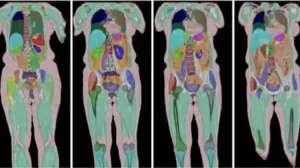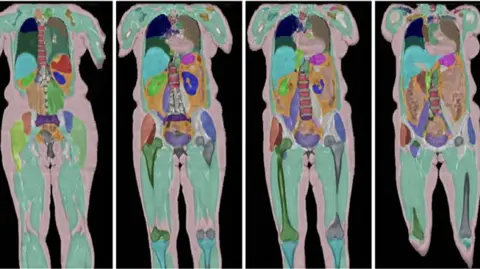The UK Biobank project has recently achieved a significant milestone by scanning its 100,000th participant. This ambitious study, which focuses on human imaging, has been ongoing for a decade and a half, with the primary objective to gather comprehensive data on the health and biological characteristics of a vast pool of volunteers across the UK. As the largest human imaging initiative globally, it represents a major advancement in how researchers can study the human body in relation to aging and disease progression.
The milestone was reached with the scanning of a volunteer named Steve, a retired sales professional who currently dedicates his time to a charity run by his daughter. Steve’s participation in the study stands out because of his personal reasons; his mother has been diagnosed with early-stage dementia, compelling him to contribute to research that may benefit future generations. Upon stepping into the full-body MRI scanner located in an industrial park outside Reading, detailed images of his brain, blood vessels, and various organs were captured, showcasing the high-resolution capabilities of the technology used.
The UK Biobank aims not only to gather imaging data but also to combine these scans with extensive health records. The project’s team, led by Chief Scientist Professor Naomi Allen, emphasizes that early disease identification and targeted treatments are among the primary benefits of this extensive dataset. This imaging data, which comprises over a billion scans, is made available to researchers worldwide at low cost with the aim of discovering preventative measures for prevalent health issues like heart disease and cancer.
The project operates on a rigorous schedule, scanning participants for around thirteen hours daily, every day of the week, across four dedicated sites in England. Each volunteer undergoes a five-hour appointment utilizing various imaging techniques, including MRI, X-rays, and ultrasound scans, which together generate a wealth of data on anatomical and functional changes over time. However, to ensure participant privacy, all data collected is anonymized, and individual feedback is only provided in cases where serious health conditions are detected during the scans.
Since its inception in 2003, the UK Biobank has become one of the largest repositories of biological samples and health information globally, collecting detailed health and lifestyle data from around half a million middle-aged volunteers. This includes physical tests and biological samples, which are stored at ultra-low temperatures for future research. Notably, the imaging component of the project began in 2014 and is set to continue with repeated scans of participants every few years.
The implications of the UK Biobank extend beyond mere data collection. Researchers are harnessing advanced technologies, such as artificial intelligence, to analyze the extensive dataset. This has drastically improved the speed and detail of data analysis, making it feasible to extract valuable health insights where manual analysis would take an unsustainable amount of time. Peer-reviewed papers utilizing UK Biobank data have proliferated, indicating a thriving research ecosystem built around the project.
The findings that have emerged since the initiative’s launch have significant public health implications. For example, studies have shown that the early onset of various common diseases can be predicted with remarkable accuracy when imaging data is integrated with other health information. Additional insights include potential links between daily alcohol consumption and memory loss as well as the ability of detailed MRI scans to assess liver disease without invasive procedures.
Furthermore, the UK Biobank is recognized globally as a vital contributor to medical research, alongside similar initiatives in countries like Germany and China. The project operates on a non-profit basis and was established with funding from reputable organizations, including the Medical Research Council and the Wellcome Trust.
As the UK Biobank matures, the potential for it to enrich our understanding of health and disease continues to grow, reinforcing the critical role of large-scale studies in modern biomedical research.











